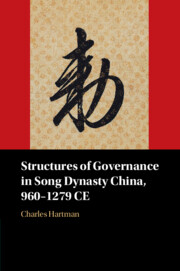Book contents
- Structures of Governance in Song Dynasty China, 960–1279 CE
- Structures of Governance in Song Dynasty China, 960–1279 CE
- Copyright page
- Contents
- Figures
- Tables
- Preface
- Notes on the Cover and on the Text
- Introduction
- Part I Dual Faces of the Song State
- 1 Gentlemen versus Petty Men
- 2 Virtue versus Talent
- 3 Inner versus Outer: The Politics of Political Space
- 4 Collective versus Unilateral Decision Making
- 5 The Technocratic–Confucian Continuum
- Part II The Technocratic and Confucian Models of Governance
- Part III Interactions
- Appendix of Senior Administration Positions, 1162–1182
- Bibliography
- Index
5 - The Technocratic–Confucian Continuum
from Part I - Dual Faces of the Song State
Published online by Cambridge University Press: 30 March 2023
- Structures of Governance in Song Dynasty China, 960–1279 CE
- Structures of Governance in Song Dynasty China, 960–1279 CE
- Copyright page
- Contents
- Figures
- Tables
- Preface
- Notes on the Cover and on the Text
- Introduction
- Part I Dual Faces of the Song State
- 1 Gentlemen versus Petty Men
- 2 Virtue versus Talent
- 3 Inner versus Outer: The Politics of Political Space
- 4 Collective versus Unilateral Decision Making
- 5 The Technocratic–Confucian Continuum
- Part II The Technocratic and Confucian Models of Governance
- Part III Interactions
- Appendix of Senior Administration Positions, 1162–1182
- Bibliography
- Index
Summary
Chapter 5, “The Technocratic–Confucian Continuum,” establishes a working definition of the technocratic versus Confucian approaches to governance and completes the basic construction of three model types, termed “imperial technocracy,” “Confucian institutionalism,” and the “technocratic–Confucian continuum.” As applied to Song, I use the term “technocracy” to designate a wide range of functionaries who held positions that required specialized knowledge often acquired through family training or guilds (military servitors, clerks, artisans) or through specialized programs of service (eunuchs, female officials) rather than through the “presented scholar” (jinshi 進士) examination system, and who retained these positions for life. Although different from each other, these groups shared a distinctively non-literati, non-Confucian political culture. “Confucian institutionalism” is governance advocated and practiced by officials who (1) had entered service through the jinshi exam system, (2) were committed to a Confucian belief system, and (3) supported a system of established institutions and regulations that they believed would advance a governance that manifested those beliefs. The basic distinction therefore between technocratic and Confucian governance is between primacy given either to technocratic competence or to the belief system that supposedly undergirded Song institutions. The “technocratic–Confucian continuum” envisions the entirety of Song political culture along a continuum that comprised these two poles.
- Type
- Chapter
- Information
- Structures of Governance in Song Dynasty China, 960–1279 CE , pp. 115 - 140Publisher: Cambridge University PressPrint publication year: 2023

